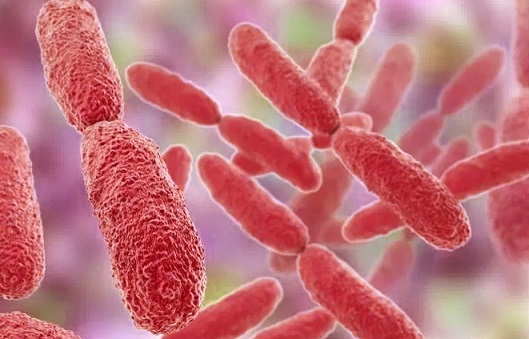Are COVID-19 Infections Triggering the Emergence of Drug-Resistant Klebsiella Pneumoniae Strains With the NDM-1 Gene?
Nikhil Prasad Fact checked by:Thailand Medical News Team Apr 24, 2025 2 hours, 3 minutes ago
Medical News: A new study raises serious public health alarms after discovering that COVID-19 infections may be linked to the emergence and spread of an extremely dangerous and drug-resistant strain of Klebsiella pneumoniae, a bacteria commonly associated with hospital-acquired infections. The strain identified carries the NDM-1 gene—short for New Delhi Metallo-beta-lactamase-1—a genetic marker that makes bacteria resistant to almost all existing antibiotics, including the most powerful ones known as carbapenems.
 Are COVID-19 Infections Triggering the Emergence of Drug-Resistant Klebsiella Pneumoniae Strains
Are COVID-19 Infections Triggering the Emergence of Drug-Resistant Klebsiella Pneumoniae Strains
With the NDM-1 Gene
The research was carried out by scientists from multiple institutions: the Department of Bacteriology and Virology at Shiraz University of Medical Sciences (Iran), the Vaccine and Infectious Disease Organization and the School of Public Health at the University of Saskatchewan (Canada), and departments at Ferdowsi University of Mashhad and Quchan University of Technology (Iran). This
Medical News report highlights the study’s key finding—an NDM-1-carrying Klebsiella pneumoniae strain recovered from a critically ill COVID-19 patient in an ICU in Sanandaj, Iran.
A Superbug Born in the ICU
The patient, a 68-year-old man admitted to the intensive care unit at Besat Hospital with severe COVID-19, was found to be infected with this extensively drug-resistant (XDR) bacterial strain. The bacteria were isolated from his lung fluid and tested against 15 types of antibiotics. Shockingly, it was resistant to all but one—tigecycline.
Using whole genome sequencing, the team identified the strain as part of a high-risk bacterial lineage known as ST15, which has been implicated in numerous hospital outbreaks worldwide. Further analysis revealed it harbored multiple resistance genes located on large plasmids—circular DNA molecules that bacteria can exchange, rapidly spreading resistance.
The NDM-1 Plasmid—A Genetic Trojan Horse
One plasmid, in particular, measured over 269,000 base pairs and carried the infamous blaNDM-1 gene, alongside several others including blaOXA-1, qnrB1, and CTX-M-15. This combination of resistance factors means the bacteria can resist not just carbapenems but also quinolones, beta-lactams, aminoglycosides, and even the commonly used antibiotic trimethoprim-sulfamethoxazole. The strain was also found to have resistance to nitrofurantoin and piperacillin-tazobactam, often used for urinary and respiratory infections.
The study also reported that the NDM-1 gene was located on a plasmid type known as IncHI1B, which is notorious for enabling horizontal gene transfer between different bacterial species. This is a key reason why NDM-1 has been spreading globally with alarming speed.
Why COVID-19 Might Be Fueling This Crisis
During the COVID-19 pandemic, ICUs around the world were overwhelmed with critically ill patients requiring prolonged hosp
ital stays and multiple antibiotics. The overuse and misuse of broad-spectrum antibiotics during this time, often given preemptively to prevent secondary infections, has likely contributed to the rise of resistant bacteria like the one described in this study.
The researchers noted a concerning rise in CR-KP (carbapenem-resistant Klebsiella pneumoniae) cases in several countries during and after the COVID-19 peak years. In Italy, for instance, prevalence surged from 6.7% to over 50% between 2019 and 2020. Similar patterns were observed in New York and parts of Asia and South America.
A Global Threat Needs Global Surveillance
The strain described in this study doesn’t just resist treatment—it can potentially spread its resistance genes to other bacteria. This makes it a formidable enemy not only for individual patients but for entire healthcare systems, especially in intensive care settings.
The authors stress the urgent need for genomic surveillance in hospitals and stricter antimicrobial stewardship to curb the rise of such superbugs. They also suggest that blocking the transmission of these resistance-carrying plasmids could be a novel approach to slowing down the crisis.
Conclusion
This alarming discovery sheds light on a potential side effect of the COVID-19 pandemic that’s just beginning to emerge—an increase in deadly, drug-resistant bacterial infections in hospital settings. As seen in the case of the CRKP-51 strain, COVID-19-related ICU admissions and the widespread use of antibiotics may be inadvertently selecting for bacteria that can evade nearly all current treatments.
The findings underscore the urgent need for hospitals worldwide to improve infection control, limit unnecessary antibiotic use, and invest in research targeting bacterial resistance mechanisms. If left unchecked, the NDM-1 gene and other resistance markers could usher in a new era of "post-antibiotic" medicine, where even minor infections could once again become deadly.
The study findings were published in the peer reviewed Journal of Tropical Medicine.
https://onlinelibrary.wiley.com/doi/10.1155/jotm/6616950
For the latest COVID-19 News, keep on logging to Thailand
Medical News.
Read Also:
https://www.thailandmedical.news/news/breaking-study-discovers-presence-of-prion-like-domains-in-sars-cov-2-that-affects-binding-affinity-to-ace2-every-variant-has-different-prion-like-dom
https://www.thailandmedical.news/news/u-s-nih-study-warns-of-lingering-damage-to-immune-and-metabolic-systems-and-increased-cancer-risk-after-covid-19-infection
https://www.thailandmedical.news/news/sars-cov-2-disrupts-human-rna-expression-splicing-and-polyadenylation-mechanisms-extreme-effects-seen-in-severe-cases
https://www.thailandmedical.news/articles/coronavirus
https://www.thailandmedical.news/pages/thailand_doctors_listings
